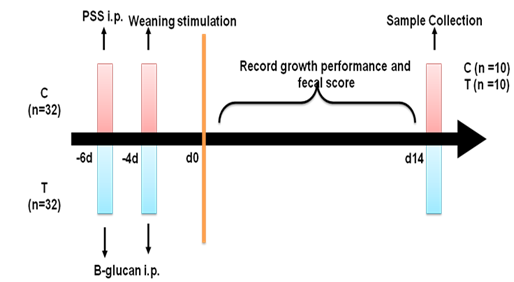The Benefits of β-Glucan Injection during Suckling: Enhancing Immune Responses and Intestinal Health in Newly Weaned Rabbits
Abstract
The rabbits that have just been weaning are vulnerable to erratic infectious agents, which frequently cause diarrhoea. Natural immunity can also be educated, according to recent research. A quicker and more potent immune response to both homolog and heterogeneous recurrence is a crucial component of acquired immunity. As a result, the current study examined the process of diarrhoea protection provided by intraperitoneal administration of Beta-glucan during the nursing period in weaned rabbits. Sixty-four nursing rabbits were randomly divided into the control group (C) and the trained group (T), according to bodyweight and breed. Physiological saline solution (PSS) and Beta-glucan dissolved in PSS were intraperitoneally administered into the rabbits in the two groups at 6 and 4 days prior to weaning, respectively. Two weeks after weaning, 1 5 rabbits from every group were selected at random for sampling. The trained group's crypt depth and diarrhoea rate were shown to be lower (P 0.04 or P 0.02) in the results. Tumour necrosis factor-alpha (TNF-alpha) and interleukin-15 (IL-10) gene expression increased while interleukin-65(IL-5) gene expression decreased in rabbits receiving Beta-glucan during suckling when compared to the control group (P 0.01). Following weaning, pre-stimulation with Beta-glucan also enhanced the content of ileal secretory immunoglobulin (sIgA) and lysozyme (LYZ) as well as serum immunoglobin A (IgA) and G (IgG) (P 0.04). Additionally, the trained rabbits displayed decreased serum levels of hydroxyl radicals and malondialdehyde (MDA) (P 0.002). Notably, the trained group's ileum mucus' microbial populations had more homogeneity and aggregation. Our findings provided experimental and theoretical support for the use of Beta-glucan-induced trained immunity in preventing intestinal infection after weaning in rabbits. Pre-stimulation with Beta-glucan before weaning improved intestinal health by enhancing the immunity ability of both innate and adaptive immune in the newly weaned rabbits.
References
Wang, Q., Fu, W., Guo, Y., Tang, Y., Du, H., Wang, M., Liu, Z., Li, Q., An, L., Tian, J. and Li, M., 2019. Drinking warm water improves growth performance and optimizes the gut microbiota in early postweaning rabbits during winter—animals, 9(6), p.346.
Ding, Y., Yan, Y., Chen, D., Ran, L., Mi, J., Lu, L., Jing, B., Li, X., Zeng, X. and Cao, Y., 2019. Modulating effects of polysaccharides from the fruits of Lycium barbarum on the immune response and gut microbiota in cyclophosphamide-treated mice. Food & function, 10(6), pp.3671-3683.
Abdelnour, S.A., Swelum, A.A., Salama, A., Al-Ghadi, M.Q., Qattan, S.Y., Abd El-Hack, M.E., Khafaga, A.F., Alhimaidi, A.R., Almutairi, B.O., Ammari, A.A. and El-Saadony, M.T., 2020. The beneficial impacts of dietary phycocyanin supplementation on growing rabbits under high ambient temperature. Italian Journal of Animal Science, 19(1), pp.1046-1056.
Dabbou, S., Ferrocino, I., Gasco, L., Schiavone, A., Trocino, A., Xiccato, G., Barroeta, A.C., Maione, S., Soglia, D., Biasato, I. and Cocolin, L., 2020. Antimicrobial effects of black soldier fly and yellow mealworm fats and their impact on the gut microbiota of growing rabbits—animals, 10(8), p.1292.
Basyony, M., Morsy, A.S. and Soltan, Y.A., 2023. Extracts of Apricot (Prunus armeniaca) and Peach (Prunus pérsica) Kernels as Feed Additives: Nutrient Digestibility, Growth Performance, and Immunological Status of Growing Rabbits. Animals, 13(5), p.868.
Delgado, R., Abad-Guamán, R., Nicodemus, N., Diaz-Perales, A., García, J., Carabaño, R. and Menoyo, D., 2019. Effect of pre-and post-weaning dietary supplementation with arginine and glutamine on rabbit performance and intestinal health. BMC veterinary research, 15(1), pp.1-12.0.
Rodríguez, M., Carro, M.D., Valiente, V., Formoso-Rafferty, N. and Rebollar, P.G., 2019. Supplementation with fish oil improves meat fatty acid profile, although it impairs the growth performance of early-weaned rabbits—animals, 9(7), p.437.
Liu, L., Zuo, W. and Li, F., 2019. The dietary addition of Artemisia argyi reduces diarrhea and modulates the gut immune function without affecting the growth performances of rabbits after weaning. Journal of Animal Science, 97(4), pp.1693-1700.
El-Neney, B.A., Zeedan, K.I., El-Kotamy, E.M., Gad, G.G. and Abdou, A., 2019. Effect of using prickly pear as a source of dietary feedstuffs on productive performance, physiological traits, and immune response of rabbit. 2-prickly pear peels. Egyptian Journal of Nutrition and Feeds, 22(1), pp.91-106.
Huang, T., Peng, X.Y., Gao, B., Wei, Q.L., Xiang, R., Yuan, M.G. and Xu, Z.H., 2019. The effect of Clostridium butyricum on gut microbiota, immune response, and intestinal barrier function during the development of necrotic enteritis in chickens. Frontiers in microbiology, 10, p.2309.
Wang, K., Zhang, H., Han, Q., Lan, J., Chen, G., Cao, G. and Yang, C., 2020. Effects of astragalus and ginseng polysaccharides on growth performance, immune function and intestinal barrier in weaned piglets challenged with lipopolysaccharide. Journal of animal physiology and Nutrition, 104(4), pp.1096-1105.
Abo Ghanima, M.M., Abd El-Aziz, A.H., Noreldin, A.E., Atta, M.S., Mousa, S.A. and El-Far, A.H., 2020. β-glucan administration improves growth performance and gut health in New Zealand White and APRI rabbits with different breed responses. Plos one, 15(6), p.e0234076.
Fu, J., Wang, T., Xiao, X., Cheng, Y., Wang, F., Jin, M., Wang, Y. and Zong, X., 2021. Clostridium butyricum ZJU-F1 benefits the intestinal barrier function and immune response associated with its modulation of gut microbiota in weaned piglets—cells, 10(3), p.527.
Li, C., Niu, J., Liu, Y., Li, F. and Liu, L., 2021. The effects of oregano essential oil on production performance and intestinal barrier function in growing Hyla rabbits. Italian Journal of Animal Science, 20(1), pp.2165-2173.
Wang, X., Wang, S.S., Yan, F., Yang, W.Q., Tang, G.F., Cui, M.H. and Xu, X.R., 2023. Intraperitoneal injection of β-glucan during the suckling period improved the intestinal health of newly weaned rabbits by enhancing immune responses—Livestock Science, 272, p.105214.







